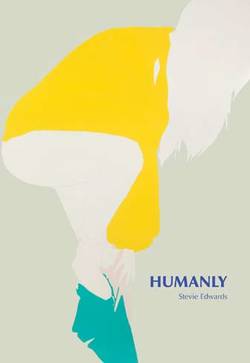
Humanly by Stevie Edwards
Paperback: 148 pages
Publisher: Small Doggies Press (2015)
Purchase: @ Small Doggies Press
Review by Rhiannon Thorne
In Good Grief (Write Bloody 2012), her first collection, Stevie Edwards came out swinging her own sense of loneliness and hit readers hard. Her poems were for the young twenty-somethings slinging grief over their backs, trying to find a “reason why,” and for those who were still ship-wrecked on teen years and aching.
Although readers will recognize recurring themes and events from Good Grief, such as the death of Edwards' uncle, in Humanly she matriculates, becoming one of a small school of poets who, if you can forgive the pun, humanly voice what it is to live with a mental illness—what it is to have battled and survived, even if only by a thread of luck. Not meant to be moralistic, Edwards presents a series of events and truths with rugged frankness. In “Accident” she asks:
How many tragedies does it take
to turn off all the light bulbs
and slip into a shadow more suitable
for unliving in?
The answer: if you have to ask,
there is still more to lose.
Broken into four sections, Edwards moves through several themes: suicide, rape, institutionalization, and love. Beginning with “Luck, Luck, Noose,” she discusses the suicides of two men and her own attempts, and moves through a series of raw poems: her fear of side effects from medicine, mania, and developing a “new norm”— what can a person get used to as normal? In my opinion her strongest and most chilling section, “Dread Clothes,” seamlessly picks up where Good Grief left off and introduces us to a more mature Edwards who is more likely than early Edwards to slyly turn a phrase instead of directly leading a reader by the nose through her work. This slows Humanly's consumption and allows for new depths.
Whereas Edwards was close to prey in Good Grief--if only prey to herself—in Humanly she becomes full predator, more in control of her sexuality. Manic or not, she is aware of her capacity to devour and stops writing about sexual encounters apologetically or promiscuously:
I house multitudes of predators,
lions and tigers and bears sharpening
their fangs for you. Oh my
dim-hearted darling, we will have to
dine on your patchy chest hair
and nonchalance.
- “Come Ye Faithful Savior Man”
Even when recounting a “no” that did not quite go as planned (“Boundaries”: When he pulled my panties down, / said, You asked what was special / about Arkansas, I told myself / it would be easier if I just said yes), Edward's voice is strong and reflective. Although she did not then, now she has an ownership and sense of control over her own fate. And here, even at her lowest and most vulnerable, discussing when she was in the ward after a suicide attempt, she writes with the self-acceptance (if still self-fear) one with mental illness long aspires to achieve.
In her final section “Anchor,” Edwards makes it clear she means to stay, saying “Goodbye to the Poetics of Recklessness”:
You can keep my dowry
of wine bottles, keep
every death you've hoarded
in me. I don't need
your gaudy chandeliers of
just one more time.
I can close my eyes
and be filled with light.
I look forward to seeing where Edwards takes us next.
Die-hard fans of spoken word will prefer Good Grief; for the rest of us, there is Humanly, roaring.
Paperback: 148 pages
Publisher: Small Doggies Press (2015)
Purchase: @ Small Doggies Press
Review by Rhiannon Thorne
In Good Grief (Write Bloody 2012), her first collection, Stevie Edwards came out swinging her own sense of loneliness and hit readers hard. Her poems were for the young twenty-somethings slinging grief over their backs, trying to find a “reason why,” and for those who were still ship-wrecked on teen years and aching.
Although readers will recognize recurring themes and events from Good Grief, such as the death of Edwards' uncle, in Humanly she matriculates, becoming one of a small school of poets who, if you can forgive the pun, humanly voice what it is to live with a mental illness—what it is to have battled and survived, even if only by a thread of luck. Not meant to be moralistic, Edwards presents a series of events and truths with rugged frankness. In “Accident” she asks:
How many tragedies does it take
to turn off all the light bulbs
and slip into a shadow more suitable
for unliving in?
The answer: if you have to ask,
there is still more to lose.
Broken into four sections, Edwards moves through several themes: suicide, rape, institutionalization, and love. Beginning with “Luck, Luck, Noose,” she discusses the suicides of two men and her own attempts, and moves through a series of raw poems: her fear of side effects from medicine, mania, and developing a “new norm”— what can a person get used to as normal? In my opinion her strongest and most chilling section, “Dread Clothes,” seamlessly picks up where Good Grief left off and introduces us to a more mature Edwards who is more likely than early Edwards to slyly turn a phrase instead of directly leading a reader by the nose through her work. This slows Humanly's consumption and allows for new depths.
Whereas Edwards was close to prey in Good Grief--if only prey to herself—in Humanly she becomes full predator, more in control of her sexuality. Manic or not, she is aware of her capacity to devour and stops writing about sexual encounters apologetically or promiscuously:
I house multitudes of predators,
lions and tigers and bears sharpening
their fangs for you. Oh my
dim-hearted darling, we will have to
dine on your patchy chest hair
and nonchalance.
- “Come Ye Faithful Savior Man”
Even when recounting a “no” that did not quite go as planned (“Boundaries”: When he pulled my panties down, / said, You asked what was special / about Arkansas, I told myself / it would be easier if I just said yes), Edward's voice is strong and reflective. Although she did not then, now she has an ownership and sense of control over her own fate. And here, even at her lowest and most vulnerable, discussing when she was in the ward after a suicide attempt, she writes with the self-acceptance (if still self-fear) one with mental illness long aspires to achieve.
In her final section “Anchor,” Edwards makes it clear she means to stay, saying “Goodbye to the Poetics of Recklessness”:
You can keep my dowry
of wine bottles, keep
every death you've hoarded
in me. I don't need
your gaudy chandeliers of
just one more time.
I can close my eyes
and be filled with light.
I look forward to seeing where Edwards takes us next.
Die-hard fans of spoken word will prefer Good Grief; for the rest of us, there is Humanly, roaring.

Stevie Edwards is a poet, editor, educator, and an advocate for mental health awareness. She is currently Editor-in-Chief at Muzzle Magazine, Acquisitions Editor at YesYes Books, and a Lecturer at Cornell University. Her first book, GOOD GRIEF (Write Bloody 2012), won an open manuscript contest and received two post-publication awards, the Independent Publisher Book Awards Bronze in Poetry and the Devil's Kitchen Reading Award from Southern Illinois University - Carbondale. Her second book, HUMANLY, was recently released by Small Doggies Press. Her poems have appeared in Verse Daily, Rattle, Devil's Lake, Indiana Review, Salt Hill, and elsewhere. She holds an MFA from Cornell University and a BA from Albion College.
